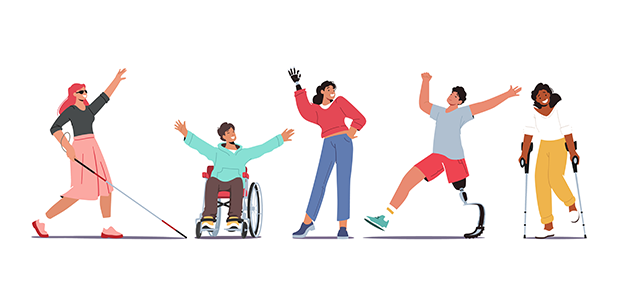
Celebrating disabled founders
Entrepreneurship presents vast opportunities for people looking to work for themselves and make their hobby or interest their career. According to a report by Lloyds Bank, 25% of entrepreneurs in the UK are disabled or neurodiverse.
Disabled founders are making waves across industries and supporting their communities along the way. However, when you are starting out it can be difficult to know who to go to or where to access funding and resources. This article breaks down the different ways aspiring entrepreneurs can receive support and be prepared for success.
Creating a network
Being a business owner can be a lonely experience. Unless you have a co-founder or more, navigating everything from logistics to product design to financing can put you to the ultimate test. The good news is that in the last decade new opportunities to grow your network have become available, with some that specifically cater for disabled founders. While primarily aimed at providing internships and work placements for disabled students and graduates, Leonard Cheshire also offers entrepreneurship support, as just one example. Their Change 100 programme can help budding entrepreneurs develop the skills and confidence needed to start their own businesses through mentorship and practical experience. Mentorship can be invaluable for entrepreneurs. Mentors within such programs have experience of working with disabled entrepreneurs which means they can provide tailored advice and networking with other disabled business owners can also offer support, shared experiences, and opportunities for collaboration.
Accessing financial support
Financing is often one of the biggest hurdles for any entrepreneur. Fortunately, disabled founders can access several grants, loans, and funding programs designed to support them.
StartAbility is an example of how budding entrepreneurs can access this. It’s an initiative designed to help disabled individuals start their own businesses. This one also offers mentorship, workshops, and resources tailored to the needs of disabled entrepreneurs, helping them to overcome barriers and to do well in their ventures.
Utilising business development programmes
Many programmes are specifically designed to help disabled entrepreneurs develop their skills and plans. For instance, Scope’s Support to Work Programme offers a range of services aimed at helping disabled individuals find employment or to start up on their own. Providing one-on-one support from employment advisors who can help disabled entrepreneurs develop their business ideas, the Support to Work Programme helps with important things such as writing business plans and on how to access funding and resources. Similarly, local authorities often provide business advice, training, and other services, helping with things like improving marketing strategies and managing finances.
Advocating for accessibility
Creating an accessible business environment is not just about compliance; it’s about inclusivity and expanding your market reach. This means ensuring your website is accessible to people with various disabilities, making your physical space (if you have one) accessible, and considering accessibility in your product or service design. Tools like the Web Content Accessibility Guidelines (WCAG) can help you make your online presence more accessible and can also extend to hiring practices, ensuring that your team is diverse and inclusive, to enhance your business's overall creativity and productivity.
Building a strong online presence
For many disabled entrepreneurs, an online business model can be particularly advantageous. E-commerce platforms like Shopify and Etsy, or service-based platforms like Upwork and Fiverr, provide accessible ways to reach a global audience without needing a physical storefront. Social media can also be a powerful tool for building brand awareness and connecting with customers.
Platforms such as Instagram, Facebook, and LinkedIn offer endless ways to promote your business and engage with your audience. Their features are evolving too, making engagement inclusive and making it easier for disabled creators to build a community and reach new customers. For example, alt text, captions, memes, and GIFs are all great tools to make your brand user-friendly and appeal to everyone.
Engaging with community support
Local and online communities can offer significant support and encouragement. Joining business groups, forums, or social media communities focused on disabled entrepreneurs can provide valuable insights and camaraderie. Engaging with communities can also lead to partnerships, collaborations and new business opportunities.
Understanding the access to work scheme
A recurring pattern is that there are lots of resources out there for disabled entrepreneurs to access, however, there are still many who aren’t aware of their existence. Whether it’s from charities or the government, it’s essential that schemes are promoted so equality of opportunity can be achieved. The Access to Work Scheme is a grant that people can use to help pay for things like specialist equipment or an interpreter or to cover costs for travelling for work. I know just how difficult this can be for wheelchair users even without the added costs, so it is a great tool to help with working efficiently. Only 47,230 of disabled people used it in 2022 and 2023. Given there are 16 million disabled people in the UK this is a shockingly low number. On top of that, people who are self-employed can really struggle with uncertainty in general.
My advice is to assess what areas you most need help with and take advantage of what is offered. Many entrepreneurs lose money before they start making a profit, so utilising resources is essential to fostering growth and fulfilling your ambitions.
Celebrating your successes
Finally, it's important to celebrate your achievements, no matter how small they may seem. Recognise the progress you’ve made and the obstacles you’ve overcome. Success is not just about the end goal but it’s the journey and the growth that comes with it. Entrepreneurship is filled with ups and downs, and resilience is important. Disabled entrepreneurs need to be adaptable, finding creative solutions to problems and being willing to pivot when necessary. Embracing a mindset of continuous learning and growth will help you navigate the challenges and seize the opportunities that come your way. Whatever industry you’re in, it all relies on connections so don’t be afraid to seek help to accomplish your goals.

